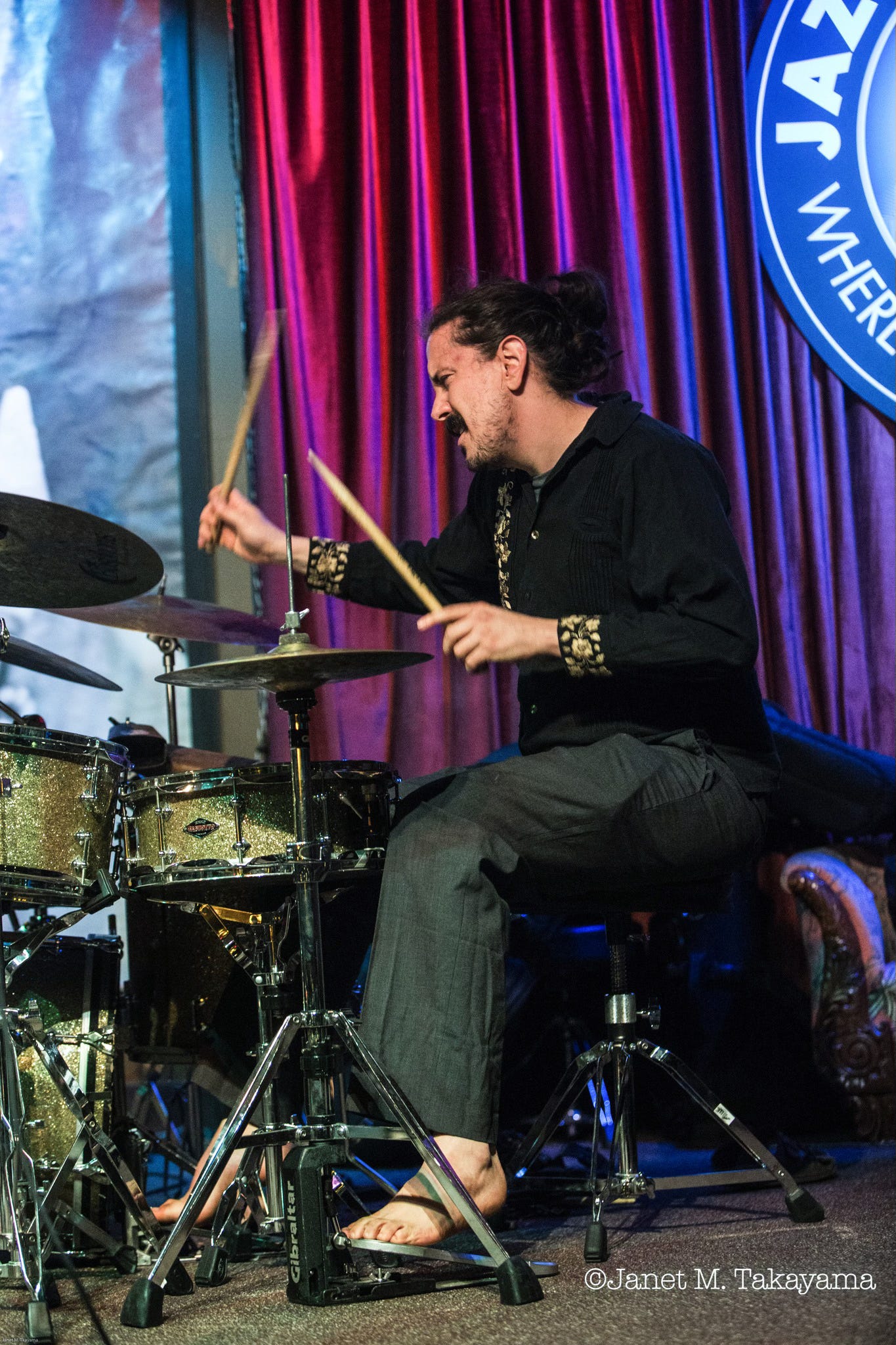Live in Chicago · Gustavo Cortiñas, drums and compositions, with Drew Hansen, trumpet; Artie Black, tenor sax; Matthew Davis, trombone; Joaquín García, piano; and Kitt Lyles, upright bass—release date, February 9, 2024; catch performances in Chicago and Mexico City this week—details below
I have written about Gustavo Cortiñas’s remarkable Kind Regards/Saludos Afectuosos record from last year. Already we have a new release: a live recording from a show at Constellation in Chicago in December of 2022. While it does not include the songs from Regards, it is a substantial retrospective work and arguably a summation, drawing material from ten years of recordings. The band most closely resembles that of Desafío Candente (“Incandescent Act of Defiance”) of 2021, but several members—Artie Black on saxophone, Joaquín García on piano, Kitt Lyles on bass—extend much farther back in their association with Cortiñas and his music. Thus the incredibly polished, incredibly joyous, risk-taking evening of music captured here.
Kind Regards is, as you may remember, an ambitious collection of bilingual songs, with wide-ranging group improvisations from an outstanding band. It was conceptually ambitious: tracing narratives of immigration between two languages, various and wide-embracing in its interests and perspectives, and also deeply personal. Cortiñas’s earlier albums share many of those qualities: Esse is collection of compositions that respond to various theories of being (Cortiñas was a philosophy minor in college), and so the second set begins with a straightforward reference to Hegel, and a track entitled “Dialectics of Freedom.” The selections from Desafío Candente go even farther: that double album responds to the whole scope of the history of Latin America, using Eduardo Galeano’s provocative book, The Open Veins of Latin America (Las venas abiertas de América Latina, 1971), as its guide. Thus we have a track, “La Ruta de Regreso a Guinea está en el Arcoíris,” that refers the resistance, across centuries and continents, of Africans to enslavement, particularly the resistance expressed through the durability of African culture. The original videos available on YouTube include passages from the book, spoken by a wide range of Cortiñas’s friends, family, and artistic network, as well as guest appearances by numerous artists; this one includes Cameroonian bassist Gros Ngolle Pokossi and vocalist Stephanie Woods Machado:
But we also have compositions that seem more or less plainly about making beautiful music, including music that relishes American traditions, as in the blues that is the second track. Cortiñas, that is, wears his concepts lightly. He is as ready to base a piece around the memory of his father (“La Balada del León”), or on a specific experience of the pain of separation brought by immigration and its myriad rules that separate people who love each other (“Wish I Could Be There Now”), as he is ambitious to write music that speaks to the great arcs of human history, or the very largest, metaphysical questions that can be posed of the universe.
Hearing these far-flung musical enterprises gathered into a single evening of music, from the same well-oiled machine of a group, a sense emerges, that rather than writing illustrative music based on theories or concepts, the concepts illustrate the deeper truths of improvisational music making, of the ongoing miracle of group interplay, of the great contours of expression and development. The music, that is, acts as a reservoir of energy and emotion from which other truths can be drawn.
That anyway is how I’m thinking about it. I notice, for example, that the evening almost begins with a drum solo—a very long drum solo. One might think—maybe better to save this until the end? Or at least the end of the first set? But that would be a conceptual error. Cortiñas’s drum solo in the first track, the “Overture” that also began Desafío, feels entirely appropriate. It is a patient, eloquent expansion of the possibilities afforded by the polyrhythmic piano ostinato (in fact a 7/4+13/8 montuno) that underlies it. It is thrilling, but it doesn’t feel like showing off in the least. It doesn’t really feel like a solo—it feels like someone speaking, speaking seriously, and joyously.
Cortiñas celebrates the release of this recording in Chicago on Wednesday Feb 7 at the Jazz Showcase, tickets here; and on Thursday in Mexico City at Zinco Jazz Club, tickets here!





